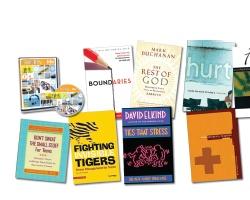Whether you’re dealing with your own stress or that of your kids, these resources should help.
Fuller Youth Institute
http://fulleryouthinstitute.org/
Fuller seminary has developed a Web site full of helpful resources on topics relevant to youth ministry. They have a nice section dealing with youth ministry and stress, including a report on the findings of a large study identifying stressors in urban ministry.
There are a number of non-faith based Web sites that offer advice on teenage stress. Some of the better sites include:
• http://www.aap.org/stress
(the American Academy of Pediatrics)
• http://www.gotanxiety.org
(an interactive site for college students)
• http://kidshealth.org
(a health and wellness site for kids and parents)
TalkSheets
This best-selling series by David Lynn has been around for a long time. Creative one-page handouts are accompanied by discussion ideas and resource lists. Each series covers lots of everyday topics that are highly relevant for today’s stressed-out Christian young people. (Zondervan)
Simplify Your Life: Making Space for Greatness
Doug Field’s “Simply Youth Ministry” series includes this three-week DVD session for young adults. He covers topics such as prioritizing time, the value of rest and relationships, and how cultural values differ from God’s values. (http://www.group.com/)
Finding the Calm: Biblical Meditations to Nourish Those Who Nurture Teens
A series of devotionals by David Haas helps re-focus stressed-out youth workers. They center on Scripture and prayer to help readers sustain a continuing commitment to young people. (St. Mary’s Press)
The Rest of God
Mark Buchanan discusses how God’s own rhythm of work and rest demands a place for Sabbath. Each chapter is followed by a “Sabbath liturgy” that provides the reader with ideas of how Sabbath can be individualized and integrated into a hectic life. (W Publishing)
Hurt: Inside the World of Today’s Teenagers
Chap Clark’s classic book was highly recommended by youth workers and educators who write about teenage stress. It is foundational reading that provides valuable insight into the hurting hearts of young people. (Baker Publishing)
Emergency Response Handbook for Youth Ministry
Group Publishing has developed a series of books and resources designed to give youth workers and youth groups the confidence to get involved with hurting friends. They include practical advice and empowerment on stress-related issues such as grief, suicide, divorce and addiction. (www.Group.com)
Boundaries
Henry Cloud and John Townsend’s bestselling book addresses the problem of over-commitment. There are a number of related books, DVDs and small-group studies that help readers process the idea of living with healthy boundaries. (Zondervan)
Ties That Stress: The New Family Imbalance
This is one of several books David Elkind has written that are considered classic reading on young people and stress. These books are not written from a faith-based perspective but give good insight into why our children live such hurried lives. (Harvard University Press)
Fighting Invisible Tigers: Stress Management for Teens
This best-selling book by Earl Hipp gives teens information on how stress affects health and decision making. While it is not faith based, students will learn stress-management skills, such as assertiveness, time management and relaxation exercises. A study guide and leader’s manual also are available. (Free Spirit Publishing)
Under Pressure and Overwhelmed: Coping with Anxiety in College
Christopher Vye, David Welch and Kathlene Scholljegerdes address the causes of stress that many students experience during college. Although it is written from a non-faith-based perspective, it provides practical advice for college students under pressure. (Greenwood Publishing)
Don’t Sweat the Small Stuff for Teens: Simple Ways to Keep Your Cool in Stressful Times
Best-selling author Richard Carlson has compiled a small, devotional-type book that offers 100 ways to deal with stress. Although it is not specifically faith based, Carlson has some good ideas on ways young people can reframe stressful situations. (Hyperion)




